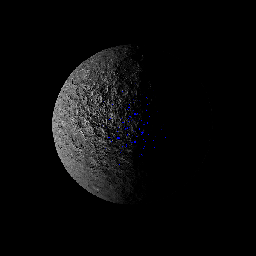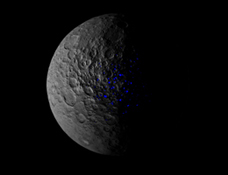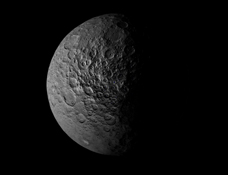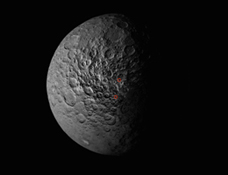
|
Ceres’ Shadowed Craters Over Time
- Click the image above for a larger view
 Movie Download Options
Movie Download Options- Full-Res JPEG (12500 x 9600) (5.5 MB)
- Full-Res TIFF (12500 x 9600) (30.8 MB)
Caption:
|
Click on an individual image for full resolution image
This animation shows how the illumination of Ceres' northern hemisphere varies with the dwarf planet's axial tilt, or obliquity.
In the first frame, Figure 1, the northern hemisphere is shown when Ceres' obliquity is 2 degrees, which is the minimum tilt. Regions that remain in shadow are shown in blue. The illumination shown is for the northern solstice, which is when the north pole is most illuminated.
The second frame, Figure 2, shows the same scene when Ceres' obliquity is 12 degrees. More polar regions are illuminated (this view is also for the northern solstice). The area of the regions that remain in shadow, marked with blue dots, is much smaller.
The third frame, Figure 3, shows the same scene when Ceres' obliquity is 20 degrees, which is the maximum tilt. The red circles show the only two craters in this scene that still have permanently shadowed regions. The polar regions are much better illuminated at this high obliquity.
Background Info:
Dawn's mission is managed by JPL for NASA's Science Mission Directorate in Washington. Dawn is a project of the directorate's Discovery Program, managed by NASA's Marshall Space Flight Center in Huntsville, Alabama. UCLA is responsible for overall Dawn mission science. Orbital ATK, Inc., in Dulles, Virginia, designed and built the spacecraft. The German Aerospace Center, the Max Planck Institute for Solar System Research, the Italian Space Agency and the Italian National Astrophysical Institute are international partners on the mission team. For a complete list of mission participants, see http://dawn.jpl.nasa.gov/mission .
For more information about the Dawn mission, visit http://dawn.jpl.nasa.gov .
Cataloging Keywords:
| Name | Value | Additional Values |
|---|---|---|
| Target | 1 Ceres | |
| System | Main Belt | |
| Target Type | Dwarf Planet | Asteroid |
| Mission | Dawn | |
| Instrument Host | Dawn | |
| Host Type | Orbiter | |
| Instrument | Framing Camera (FC) | |
| Detector | ||
| Extra Keywords | Crater, Grayscale, Movie, Shadow | |
| Acquisition Date | ||
| Release Date | 2017-03-22 | |
| Date in Caption | ||
| Image Credit | NASA/JPL-Caltech/UCLA/MPS/DLR/IDA | |
| Source | photojournal.jpl.nasa.gov/catalog/PIA21469 | |
| Identifier | PIA21469 | |



